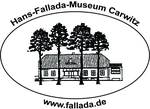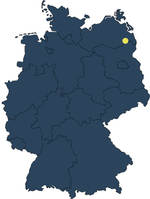Contact Information
Zum Bohnenwerder 2
17258 Feldberger Seenlandschaft
OT Carwitz
Germany
Phone: +49 39831 20359
Fax: +49 39831 20359
eMail: museum@fallada.de
www.fallada.de
The property was the estate where Fallada lived from 1933 to 1944. It was opened as a museum in 1995 after a long period of alternative use. Since then the appearance has been restored with the aim of showing the estate as an authentic location of the 1930s.
The nine rooms of the house – partly equipped with the original furniture – offer many different insights into Fallada’s daily and literary life at that time.
A permanent exhibition is devoted to Fallada’s different places of residence and his personal development and it contains his complete literary legacy of First Editions. Manuscript pages, Fallada’s death mask and other exhibits make the exhibition even more comprehensive.
The former barn was converted into a large auditorium in which visitors can view special exhibitions. Moreover, it contains the rooms of the Hans-Fallada-Archive and a small apartment for academics who wish to work there. The spacious property with its apiary, the famous triangular bed and the lovingly restored boathouse invites visitors to linger.
The museum is equipped with various media (puzzle magazines for children, museum guide, audio-guide for children as well as for adults). It also comprises a projection room and listening stations.
Guided tours are offered regularly, as well as readings, lectures and litarary walks. In the museum shop visitors can purchase a vast range of publications by and about Fallada, Fallada films, audio-books and many other items.
Hans Fallada, whose real name was Rudolf Ditzen (*21.7.1893, †5.2.1947), is one of the most famous representatives of the of the so-called “new sobriety” and his socially critical novels like “Little Man What Now?”, ”A Small Circus” “The World Outside” or “Wolf Among Wolves” earned him world-wide fame already in his own lifetime.







